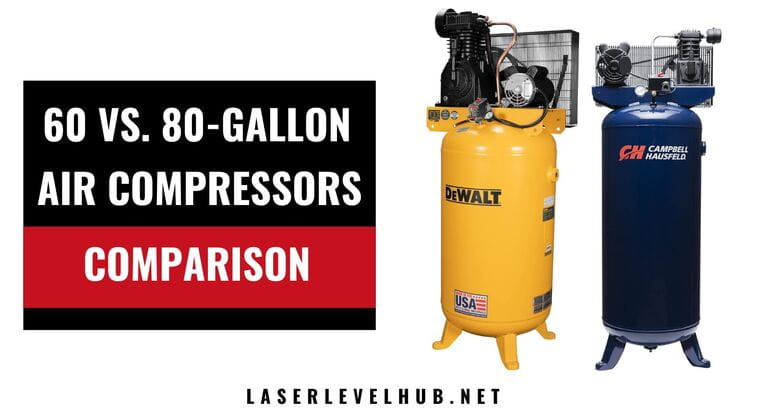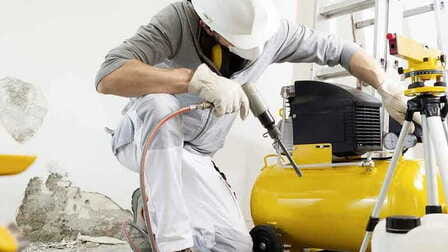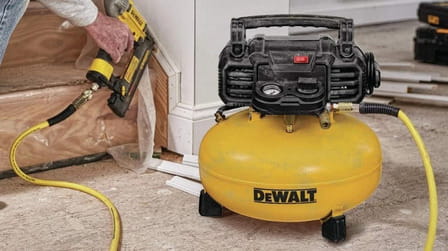Buying an air compressor for the first time? Getting the size right is probably going to be the biggest challenge to tackle. It might seem like a straightforward decision that doesn’t require much planning, but that's not usually the case.
Small differences can add up a lot, and you’d be surprised how much more you can do with an 80-gallon air compressor compared to a 60-gallon one. The difference between a 60 versus 80-gallon air compressor might seem negligible, for example, but that’s quite far from the truth in reality.
When to Use a 60-gallon Air Compressor
A 60-gallon air compressor should be good for most general purposes, especially for household use. While it's not ideal for tools that require more air, it should do the job just fine for most daily tasks. With a 60-gallon air compressor, you can easily power any tool that has a low to moderate air demand, such as nail guns, spray guns, small impact wrenches, and more.
This is the perfect air compressor for tires, for example. If you're using an impact driver, it should give you enough air to take off all of your car's tires without having to run the compressor again. You can also use a 60-gallon air compressor for an impact wrench of sizes between 1/4" and 3/4". For larger models, you will probably want to go with an 80-gallon air compressor instead.
This also makes it a great air compressor for painting small and medium-sized objects. You should be able to paint various items and relatively large surfaces with the help of a 60-gallon air compressor without having to take any breaks.
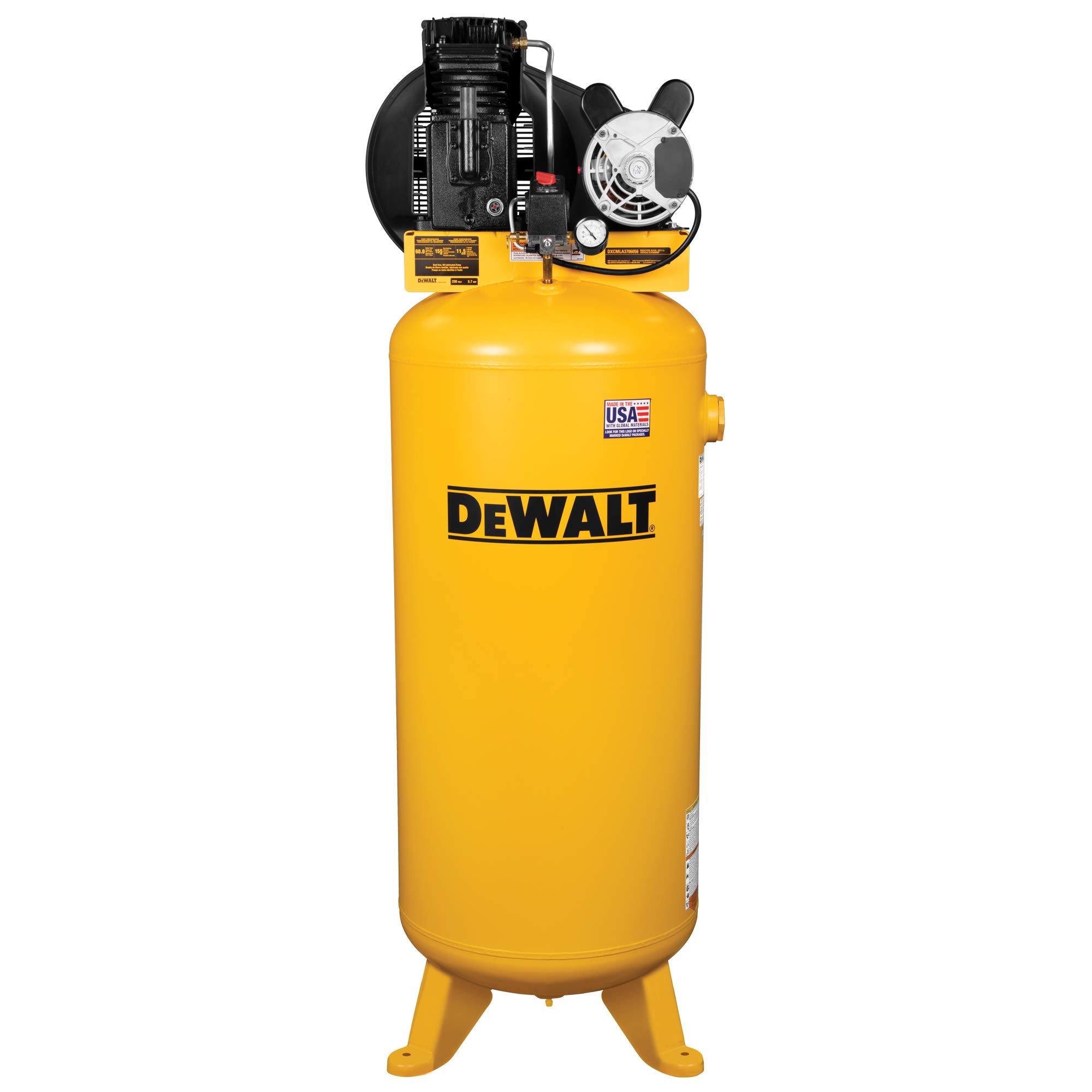
Many sanders and grinders require at least 80 gallons of air storage for uninterrupted operation, but you can power various smaller models with a 60-gallon compressor as well.
Another great advantage of 60-gallon air compressors is that they work well in situations where you're limited in space.
If you’re just starting out in your business, or are opening a secondary workshop, a 60-gallon air compressor can be a better choice than an 80-gallon one if you’re looking to save space. This can make it a suitable commercial air compressor for a small shop, although depending on what exactly you're looking to do, you might want to get an 80-gallon model instead.
You should understand your budget constraints as well before starting a search like this. A more limited budget will likely push you towards a 60-gallon model in most cases. Most 60-gallon models are much cheaper than 80-gallon models with otherwise similar specifications.
If you're only going to use this compressor at home or for a small workshop, then you probably don't need a model larger than 60 gallons. Our advice? Start with a comprehensive list of all the tools you’re using regularly. Start making this list as early as possible - if you have a larger workshop, you’re likely going to miss some details if you’re in a hurry.
When to Use an 80-gallon Air Compressor
An 80-gallon air compressor, on the other hand, is more suitable for heavy duty work and situations where you require continuous uninterrupted usage. Air sanders and grinders are two of the most common examples in this category.
Most sanders will not work with air compressors smaller than 80 gallons at all. Spray guns can also work better with an 80-gallon air compressor if you want to paint an entire car in one go. Those tools require a lot of continuous air supply, and a 60-gallon air compressor is simply not going to cut it in that case.
Most people buying an air compressor for a blaster cabinet will not go lower than 80 gallons by default. Anything less than that will typically result in the tank emptying very fast and the compressor kicking in more than it should.
The difference might not seem significant - but that’s actually an extra 33% of air volume! This can make all the difference in certain situations, especially when it comes to prolonged use.
That's why you would frequently find 80-gallon air compressors used in industrial environments, as well as various large-scale applications. Companies that handle these types of tasks typically order 80-gallon models directly so that they can have the necessary equipment for all of their work.
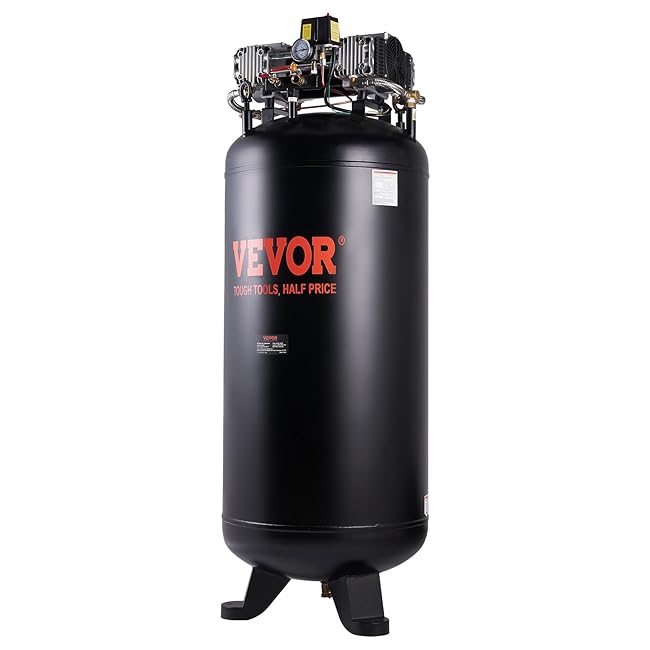
If you need a higher flow rate or higher pressure, that's another reason to go with an 80-gallon air compressor. A 60-gallon model might not be able to provide sufficient pressure, or if it can, the flow rate might not be enough for your needs.
These models come with some inherent disadvantages that are important to consider. Most notably, they take up a lot of space and are not as easy to move around your workshop. While both 60- and 80-gallon air compressor variants are typically not portable, moving a 60-gallon model is still much easier.
They also cost more, as you're probably guessing from the context. However, this can be seen as a viable long-term investment that allows you to realize better opportunities later on. You might not need an industrial air compressor right now, but purchasing one when you can afford it can help you significantly down the road.
Those are some of the main differences between 60 vs. 80-gallon air compressor models. Your individual situation might call for one model or the other, even though that might go against the general trend. This makes it important to talk to an expert if this is your first time purchasing an air compressor and you're not sure what you should be looking for.
60 vs. 80-Gallon Air Compressor: Comparison and Decision-Making Factors
When choosing between a 60 vs. 80-gallon air compressor, there are several factors to consider. Some of these might be less relevant to your specific situation, but it’s still important to keep the big picture in mind. If you’re wondering “What size air compressor do I need?”, here’s a brief rundown of the points to think about.
Another point worth remembering is that the unit’s CFM rating might be more important than its tank size. With a CFM that’s too low, you will simply not be able to provide enough power to your tools, even if you have enough air stored in the tank.
1 - Air Storage Capacity and Usage Efficiency
A larger air compressor comes with a higher air storage capacity. This can improve your efficiency during longer tasks. Additionally, a larger compressor would allow some tools to perform more effectively, instead of being limited by a low flow rate. This can be particularly important for tasks like large-scale paint jobs.
2 - Power and Performance Capabilities
Larger air compressors can also deliver more power to your tools. This might not matter much if you’re exclusively working with small tools that don’t require too much power in the first place. But in some cases, the difference can be crucial. Take a careful look at the ratings and requirements of the different tools you’re using to figure out if you can get away with a smaller air compressor.
3 - Size and Portability Considerations
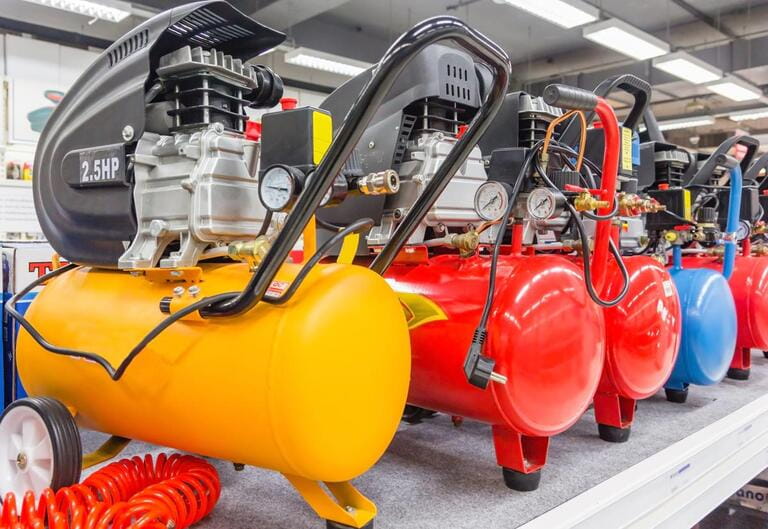
Some people care a lot about portability, others ignore that factor completely. This all depends on how you’re planning to work with your air compressor. If you’re primarily going to work out of one specific location and have enough room available in there, you should probably get an 80-gallon compressor. On the other hand, if you’re limited on space or anticipate having to move the compressor every now and then, a 60-gallon model might be more convenient.
4 - Initial Investment and Long-Term Cost Implications
Buying an 80-gallon air compressor comes with a higher upfront cost, understandably. However, this can be seen as a viable long-term investment. If you anticipate potentially needing an expansion later on, it can make more financial sense to purchase a larger model upfront. That way, you won’t have to deal with the mess of selling the old one or trying to keep using the two together.
5 - Application-Specific Requirements and Demands
Certain applications need higher power or more air capacity for optimal performance. Knowing how to choose an air compressor mainly involves understanding your specific requirements and adapting to them. Sometimes it makes a lot more sense to go with a more expensive model right off the bat, instead of starting out with a cheaper one.
And in some cases, there isn’t really any choice. You simply need a high-capacity air compressor for certain uses, and there’s no way to circumvent that.
Conclusion
The differences between a 60 vs. 80-gallon air compressor might seem negligible, but they are anything but that. You need to be well aware of all implications of buying a larger or smaller model and calculate your requirements as precisely as possible.
Deciding on a 60 versus 80-gallon air compressor is something that can take time if this is your first time shopping for a product like that. As we mentioned above, never be afraid to reach out to a professional for additional guidance if you feel confused at any point.
